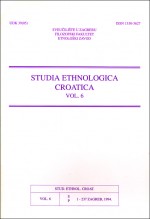The Kurds Today: Between Local, Regional and National Identity
The Kurds Today: Between Local, Regional and National Identity
Author(s): Leszek DziegelContributor(s): Jadranka Puntarović (Translator)
Subject(s): Geography, Regional studies, Cultural Anthropology / Ethnology, Migration Studies, Ethnic Minorities Studies, Identity of Collectives
Published by: Sveučilište u Zagrebu, Filozofski fakultet
Keywords: Kurds; post-Soviet Transcaucasia; identification; Kurdish refugees; forced assimilation; Kurdish Autonomous Region;
Summary/Abstract: Particularly interesting from the point of view of culture studies is the situation of Kurds in post-Soviet Transcaucasia. Their original ethnic and religious composition was far from homogeneous. In Armenia, most of the Kurdish-speaking settlers in the early 19th century were Yezidis, who fled from persecution at the hands of their Muslim compatriots and the Turkish administration. Nevertheless, the Russian administration in Transcaucasia regarded them for generations as Kurds. Side by side with them, there also lived - among the Transcaucasian Azerbaijani population - Kurdish refugees of the Muslim faith. Under the Soviet rule, the Armenian Kurds enjoyed considerable cultural freedom, although at times they too fell victim to repression. In Azerbaijan, on the other hand, they were subjected to a policy of forced assimilation into the Turkish-speaking Azerbaijani population. Currently, an idea is being formed among the Kurdish-speaking Transcaucasian Yezidis to establish a non-Kurdish, religious ethnic community of their own, in opposition to Islam. Muslim Kurds in Transcaucasia, in their turn, demand the re-establishment of the Kurdish Autonomous Region, dissolved by Stalin.
Journal: Studia ethnologica Croatica
- Issue Year: 1994
- Issue No: 6
- Page Range: 105-117
- Page Count: 13
- Language: English

